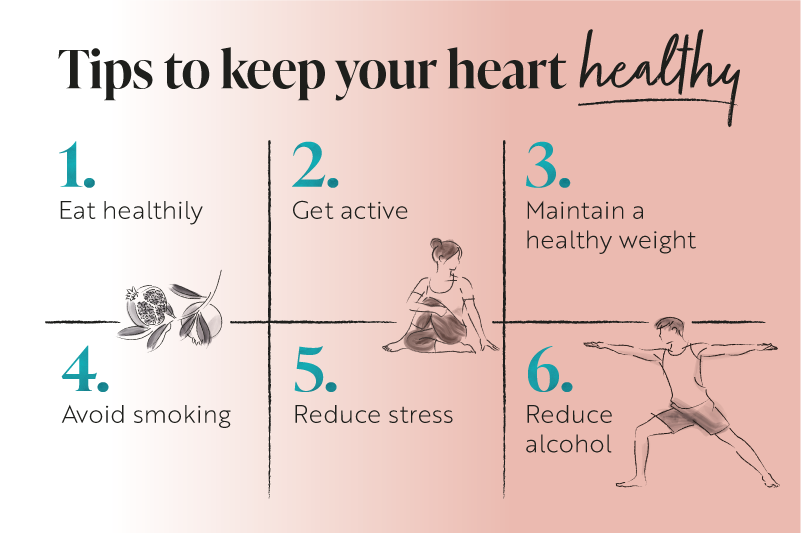Heart Awareness Month

Cardiovascular disease (CVD) is the leading cause of death worldwide, and high cholesterol is a significant risk factor. New draft guidance released by The National Institute for Health and Care Excellence (NICE) suggests that despite widening the threshold and allowing more people to be eligible for the cholesterol lowering treatment statins, doctors continue to advise those with a risk of suffering a cardiovascular event, eg heart disease or stroke, to adopt a healthier lifestyle, such as eating a balanced diet first. Read our tips to help make heart healthy habits.
Cardiovascular disease (CVD) affects 7.1 million people in the UK to date impacting men and women both equally[i]. The annual cost to the NHS to provide treatment to those suffering with CVD is around £9 billion. In their new draft guidance, NICE (which advises the NHS) has increased the threshold to allow more people to be eligible for cholesterol lowering treatment statins. The body states that GPs should encourage people falling in this new threshold who are at risk of CVD, to adopt lifestyle changes such as eating a healthy diet and exercising.
According to NICE: “People can be at risk from CVD because of factors they cannot change including their age, sex, ethnicity and family history. The draft guidance continues to recommend that risk factors which can be addressed should be managed. These include stopping smoking, reducing alcohol consumption, taking exercise and eating a healthy diet.”
What does a good heart health look like?
Common markers of heart health checked in the GP surgery are cholesterol and blood pressure. Cholesterol is measured via a blood sample and the results will indicate total cholesterol (TC), low density lipoprotein (LDL), High density Lipoprotein (HDL), and total fats (triglycerides). The government recommends that healthy adults should have a total cholesterol level below 5 mmol/L.
Triglycerides represent your body’s ability to clear fat from blood after a meal. Ideally it should be less than 1.7 mmol/L[ii] on a fasting sample or less than 2.3 mmol/L on a non-fasting sample.
Blood pressure is measured in millimetres of mercury (mmHg) and is given as 2 figures:
- systolic pressure – the pressure when your heart pushes blood out
- diastolic pressure – the pressure when your heart rests between beats
- ideal blood pressure is considered to be between 90/60mmHg and 120/80mmHg
- high blood pressure is considered to be 140/90mmHg or higher
- low blood pressure is considered to be 90/60mmHg or lower
Lifestyle Tips for good Cardiovascular Health
Eat well: A healthy diet can help lower your risk of developing coronary heart disease and prevent weight gain, reduce your risk of diabetes and hypertension. Aim to eat plenty of fruit and vegetables to ensure a high fibre intake which has inversely been associated with heart disease[iii] [iv]. Limit processed foods as well as those rich in sodium and sugar.
Get Active: Physical activity can help reduce your risk of heart and circulatory disease. It can also help you control your weight and reduce blood pressure. Make exercise a part of your daily routine.
Maintain a healthy weight: Research shows that reaching and keeping to a healthy weight cuts your risk of heart and circulatory diseases because it helps prevent and manage conditions like high blood pressure and type 2 diabetes that put you at greater risk of coronary heart disease.
Quit Smoking: Smokers are almost twice as likely to have a heart attack compared with non-smokers. If you smoke, stopping is the single most important step you can take to protect the health of your heart.
Reduce Stress: Although stress is not a directly a risk factor for heart and circulatory diseases, but it’s possible that it may contribute to overall risk level. Change your lifestyle in a positive way can help you feel better able to cope with the demands put onto you. A balanced diet, meditation and regular physical activity can help you cope with stress.
Reduce Alcohol: Drinking more than the recommended amount of alcohol can have a harmful effect on your heart and general health. Alcohol is also high in calories so it can lead to weight gain. Current recommendations are not to drink more than 14 units per week and have some alcohol-free days within the week.
Author: Aimée Benbow, BSc (Hons), MSc, ANutr. is Director of Nutrition at Viridian Nutrition.
Viridian Supplements can support health.
Available at Emporium Treatment Clinic.
Visit our SHOP here
Learn more, click to read the article ‘LOVE Your Heart’
References:
[i] British Heart Foundation, (2015), Cardiovascular Disease Statistics 2015, British Heart Foundation centre on population approaches for non-communicable disease prevention, Oxford University, UK.
[ii] NICE (2008) Accessed: 28 September 2018.Lipid modification: Cardiovascular risk assessment and the modification of blood lipids for the primary and secondary prevention of cardiovascular disease. Clinical guidance 67 (CG67)[Online] https://www.nice.org.uk/guidance/cg67
[iii] Wolk, A., Manson, J.E., Stampfer, M.J., Colditz, G.A., Hu, F.B., Speizer, F.E., Hennekens, C.H. and Willett, W.C., 1999. Long-term intake of dietary fiber and decreased risk of coronary heart disease among women. Jama, 281(21), pp.1998-2004
[iv] BHF (2018) British Heart Foundation: Healthy Eating. [Online} Accessed: 28 September 2018.https://www.bhf.org.uk/informationsupport/support/healthy-living/healthy-eating
The information contained in this article is not intended to treat, diagnose or replace the advice of a health practitioner. Please consult a qualified health practitioner if you have a pre-existing health condition or are currently taking medication. Food supplements should not be used as a substitute for a varied and balanced diet.
Skin Care & Body Analysis & Consultation
Available at Emporium Treatment Clinic provided by Angela Taffinder the founder of Emporium Treatment Clinic and practising Aesthetician for 35+ years
Contact Us here
Health & Wellness Analysis & Consultation
Available at Emporium Treatment Clinic provided by highly qualified, experienced Doctors, Nutritionist, Holistic Medicine practitioners and Wellness experts.
Contact Us here
